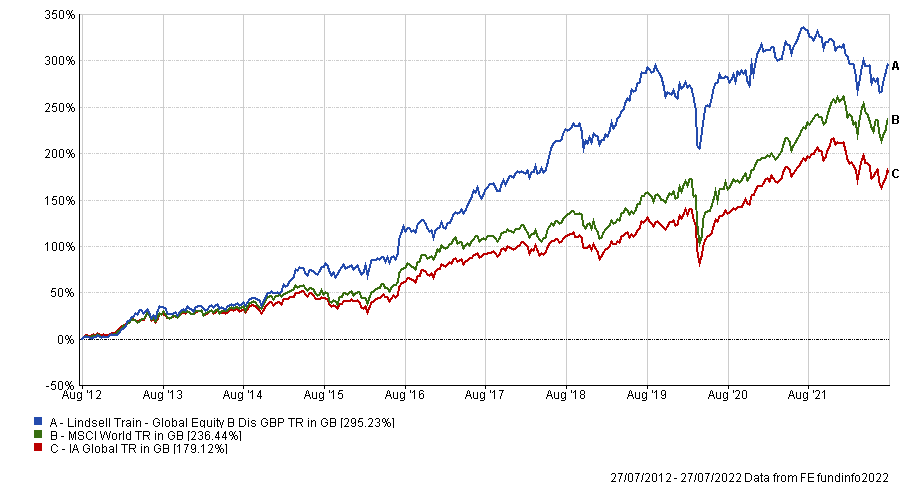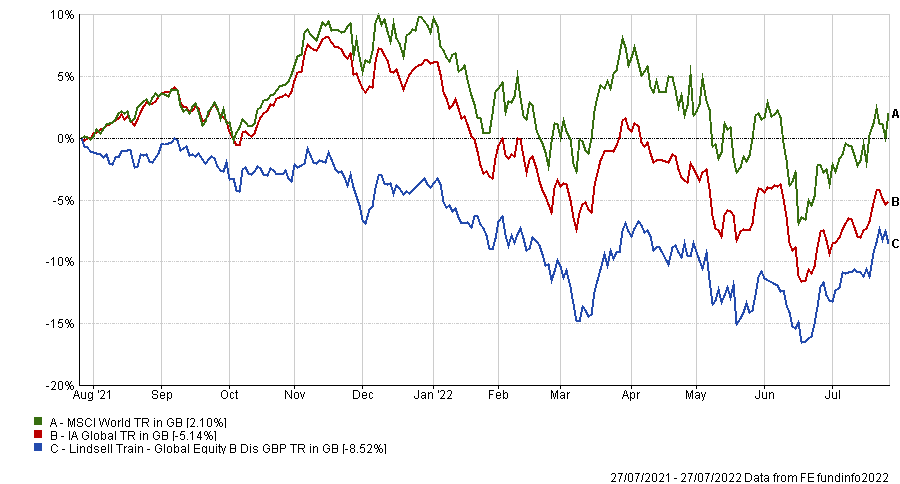Investors who have been scratching their heads over Lindsell Train Global Equity might take solace from knowing that they are not alone.
The £5.9bn fund is a top-decile performer over 10 years with a total return of close to 300% - above its average IA Global peer and MSCI World benchmark by a wide margin.
Performance of fund vs sector and benchmark over 10yrs

Source: FE Analytics
However, after delivering outstanding results in the long term, it has struggled more recently. The fund currently sits in the sector’s bottom decile on three-year view and, as the next chart shows, has posted a third-quartile loss of 8.5% over the past 12 months.
Over the very short term, things have started to look up with the fund in the top quartile over one and three months.
Performance of fund vs sector and benchmark over 1yr

Source: FE Analytics
Trustnet asked three experts whether investors should buy more of Lindsell Train Global Equity in order to profit from a possible recovery, sell out of the fund, or hold their current positioning (or lack thereof).
All experts agreed that the choppy performance is down to the fund’s growth investment style suffering as market leadership has rotated towards value stocks. Managers Michael Lindsell and Nick Train take a long-term view, looking for companies expected to still be thriving in 30 years’ time and investing heavily in stocks with high return on equity, low leverage and low earnings variability.
According to Downing multi-manager Simon Evan-Cook, “this is an immensely successful way to invest and is at the heart of what made Warren Buffett one of the richest people on the planet”.
But this approach swayed the portfolio towards longer-duration consumer staple stocks like Unilever or Diageo, which have delivered underwhelming returns over the past five years, explained 7IM senior portfolio manager Peter Sleep.
Also, ignoring technology giants such as Microsoft and Alphabet, whose values more than doubled over the same period, greatly impacted performance.
Sam Benstead, deputy collectives editor at interactive investor, noted how Lindsell Train’s other favourite stocks, such as the London Stock Exchange Group and PayPal are now struggling, as deal costs mount and economic growth slows.
On top of that, Benstead highlighted that the fund’s approach is spluttering because of high inflation and rising interest rates, to which Sleep agreed.
“The downside to these longer-duration stocks is that they can be sensitive to long-term interest rates. This was great during the twenty-teens as long term interest rates fell, and went negative in some cases, but has not been so great more recently as long-term interest rates backed up,” Sleep said.
Another factor is the high concentration of the portfolio: since inception in 2010, the fund has only ever held 26 to 35 stocks. In such a focused environment, any stocks that fall heavily can have a big impact on the overall performance.
“A fund cannot simply hold 26-odd stocks and expect to outperform every year. You cannot expect its stocks to go to the moon every year as happened in the period 2011-2018,” Sleep said.
“There are bound to be setbacks from time to time and after a period of strong growth; the fund was due a breather and sure enough it arrived, particularly 2021. It was very nice for Nick Train to apologise, but completely unnecessary.”
When it came to making a decision, Sleep felt secure holding his position.
“I have decided to hold LT because I like the defensive nature of the portfolio of stocks. I worry a little that long-term interest rates might go up, but I think on the whole, through the cycle, that Lindsell Train Global Equity will do well,” he said.
Benstead warned investors who follow Sleep to be aware that this period of underperformance could continue as interest rates rise and companies grapple with high costs and slowing economic growth.
Using a golf metaphor, Evan-Cook spoke in favour of Lindsell Train.
“After a string of birdies and pars, Lindsell Train have suddenly hit a double bogey and many of its investors are shocked. They shouldn’t be: there’s nothing wrong with the strategy or the managers, we’re just seeing conditions that don’t suit their style of investing. That’s all,” he said.
For those looking for alternatives to Lindsell Train Global, however, there are plenty.
Fundsmith Equity, picked by Sleep, has some of the same holdings, but with a tilt towards the US (Lindsell Train Global Equity has more of tilt to Japan, reflecting Michael Lindsell’s expertise in this area, and the UK, where Nick Train is experienced).
Benstead chose GuardCap Global Equity, which has done better this year than the typical global stocks fund, including Lindsell Train Global Equity and Fundsmith Equity.
Stonehage Fleming Global Best Ideas is another alternative. It buys predominantly large-cap businesses with a buy-and-hold approach, but also has a sell discipline when valuations go up too much.
Benstead also recommended Trojan Global Income as a good option for investors looking for a more defensive fund. It buys consumer staple stocks, which have reliable dividends and profits, and avoids the more expensive names that have been behind Lindsell Train’s struggles this year, like PayPal and the London Stock Exchange.
To sit alongside Lindsell Train Global Equity, Sleep would look for “something completely different” like the Schroder Global Recovery fund, “It does the opposite by investing in cheap, out of favour stocks that investors are spurning at the present time,” he said.
“I think rather than selling Lindsell Train and moving into a similar fund, the better approach is stick with Lindsell Train and supplement with something different like the Schroder Recovery fund. That way when one style of funds zigs your other fund might zag and diversify you,” he said.




